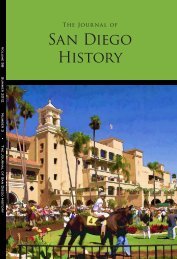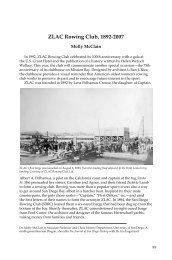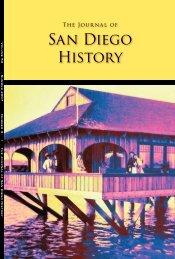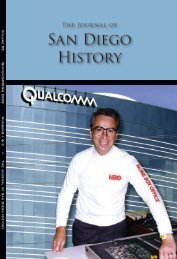Complete Journal Issue - San Diego History Center
Complete Journal Issue - San Diego History Center
Complete Journal Issue - San Diego History Center
You also want an ePaper? Increase the reach of your titles
YUMPU automatically turns print PDFs into web optimized ePapers that Google loves.
Documentaries<br />
following him to steal his mineral rights. The bank was ready to foreclose on his<br />
home. Under duress and with no resources for medical assistance, he stole the tank<br />
from the Kearny Mesa National Guard Armory.<br />
The film stylistically weaves interviews with Nelson’s family and friends,<br />
public officials, and urban historians with stock footage from World War II, the<br />
<strong>San</strong> <strong>Diego</strong> defense industries, and the Vietnam War. Scott and Olds imply that a<br />
city and region based on a war economy will experience a certain type of cultural<br />
blowback that results in a kind of institutionalized violence lying beneath the<br />
social structure. Scott and Olds connect Nelson’s life story to the larger forces<br />
that transformed the defense suburbs of <strong>San</strong> <strong>Diego</strong> throughout the 1990s. What<br />
emerges is a poignant tale of class consciousness in Southern California filtered<br />
through Shawn’s life and the many family members and friends still trying<br />
to understand the reasons for his demise. Despite the human shortcomings<br />
involved in Nelson’s tragedy, every interview segment suggests economic and<br />
social injustice. All who knew Shawn interviewed for the film—his brother, his<br />
friend Fela, Karen Rowlands, Chuck Childers, Chuck Johnson, Dale and Diane<br />
Fletcher, and roommate Tim Wyman—confirm that he was a good man, even if<br />
somewhat troubled. In a compelling scene of philosophical reflection, Nelson’s<br />
friend Fela believed that Shawn had tried to stand up to the authorities, and they<br />
had taken his life. Fela notes with disgust that the authorities had the power, but<br />
will never have the morality. Cul de Sac unflinchingly moves beyond the media<br />
sensationalism that emerged from Nelson’s rampage to ask the important question<br />
of how and why this man committed this desperate act.<br />
Ripe for Change. Written and directed by Emiko Omori. Produced by Emiko<br />
Omori and Jed Riffe. DVD. Independent Television Service, 2005. 55 minutes.<br />
Reviewed by Jeffrey Charles, Associate Professor and Chair, <strong>History</strong><br />
Department, California State University, <strong>San</strong> Marcos.<br />
In the first half of 2008, food shortages caused riots around the globe and<br />
salmonella outbreaks from imported produce sickened thousands of Americans.<br />
The skyrocketing price of oil put enormous strain on farmers who depended on<br />
gas-fueled farm equipment and petroleum-based fertilizers, and farmers all across<br />
the South and West complained about the shortage of labor caused by a U.S. Border<br />
Patrol crackdown. Based on this evidence alone, the food and agricultural system<br />
is certainly “ripe for change.” Teachers and an interested general audience can turn<br />
to this documentary for its presentation of some alternative possibilities to today’s<br />
global, industrial agriculture system – a system that California growers helped<br />
create beginning in the early twentieth century, and one that some Californians<br />
have always worked hard to reform.<br />
Ripe for Change first aired in May 2006 as part of the PBS series, California and<br />
the American Dream. This four part film series focused on how the Golden State<br />
is being transformed by immigration, economic development, and community<br />
restructuring. The series is now available on DVD as four separate films. These<br />
DVDs probably will be of most interest to libraries, educators and scholars,<br />
317


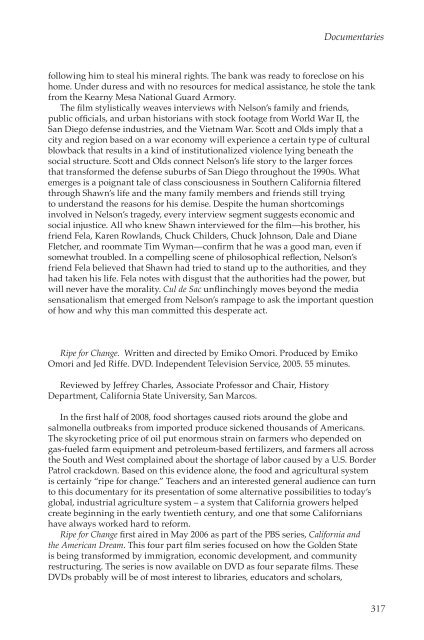
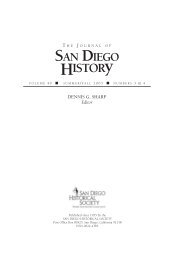
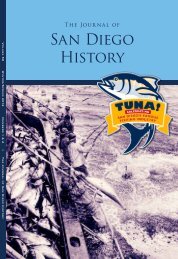
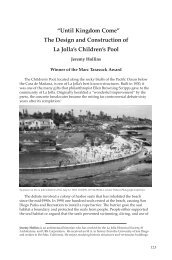
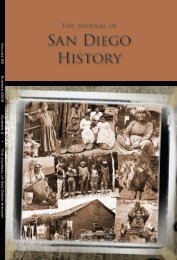
![[PDF] The Journal of San Diego History Vol 52: Nos 1 & 2](https://img.yumpu.com/25984149/1/172x260/pdf-the-journal-of-san-diego-history-vol-52-nos-1-2.jpg?quality=85)
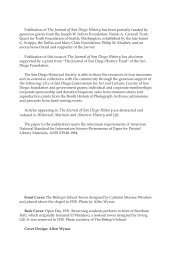
![[PDF] The Journal of San Diego History - San Diego History Center](https://img.yumpu.com/25984131/1/172x260/pdf-the-journal-of-san-diego-history-san-diego-history-center.jpg?quality=85)


